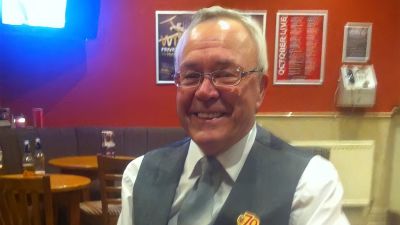Contaminated blood campaigner from Manchester dies before inquiry concludes

A devoted campaigner from Manchester who was infected with hepatitis C during the contaminated blood scandal has died at the age of 78.
Peter Mossman never gave up his fight for justice for the 4,689 people with bleeding disorders who were infected with HIV and hepatitis viruses during the 1970s and 80s.
The dad and grandad from Wythenshawe, contracted the virus in his 40s after being given a contaminated blood product which was supposed to help treat his haemophilia.
Mr Mossman was one of the first people to set up a campaign, the Manor House Group, in his bid for those responsible to take accountability for the scandal.
After having to leave his job as a coach driver, he devoted much of the remaining 35 years of his life campaigning for a public inquiry, which began in 2017 and is still ongoing today.
He sadly died on 17 December 2021 before he could see the inquiry conclude.
Mr Mossman's son, Gareth, said his father's life 'completely changed' after being given the devastating news that he had hepatitis C.
Gareth said: "He had to give up his work and he became obsessed with getting justice for everyone.
"My dad also became quite obsessed with understanding the condition he had been infected with. It was really quite sad because he stopped being affectionate with us and my mum and he used to wash his hands with bleach.
"He stopped socialising for quite a long time. For quite a number of years he was really affected by it."
Gareth said his dad spent the next three decades campaigning for a public inquiry into the scandal, and even used one of the bedrooms in their small council house to store his files.
Following the death of his wife Alison in 2018, Mr Mossman developed dementia and was unable to take an active role in the inquiry due to his health.
His son Gareth said his funeral will take place at 3.15pm on Thursday, 3 February at Altrincham Crematorium "I want the service to be packed. He deserves it. He was such a popular guy and did so much for so many people.
"My dad did everything for all of us - for the kids and his grandchildren. He never stopped. We didn’t have a lot growing up but everything he had he gave to us.
"Before he got dementia his main thing was knowing that he’d got justice. Knowing how the inquiry has turned out so far - he'd be over the moon with that."
Fellow campaigner, Carol Grayson, whose late husband was infected with HIV, described Mr Mossman as a 'brave, stoical, funny and a true friend.'
In a tribute written for the Haemophilia Society, she said his greatest achievement was founding the Manor House Group in 1984, and described him as a "strong campaigner, who kept on going when many gave up".
People with haemophilia and other bleeding disorders were given blood infected with HIV and hepatitis during the 1970s and 1980s. It was part of a new treatment which was supposed to make their lives better.
A clotting agent called Factor VIII was introduced to help blood clot, but the UK was struggling to keep up with demand, so imported supplies from the US. Much of the human blood plasma used to make it came from donors such as prison inmates and drug-users.
It is thought more than 3,000 people infected have since died and of the 1,243 people who contracted HIV, fewer than 250 are still alive.
In 2017, then Prime Minister Theresa May announced that a statutory public inquiry would be held into the scandal.
Since that announcement, it is thought more than 100 people infected and affected have died. Many more will die before the inquiry concludes.
No compensation has ever been paid to victims.